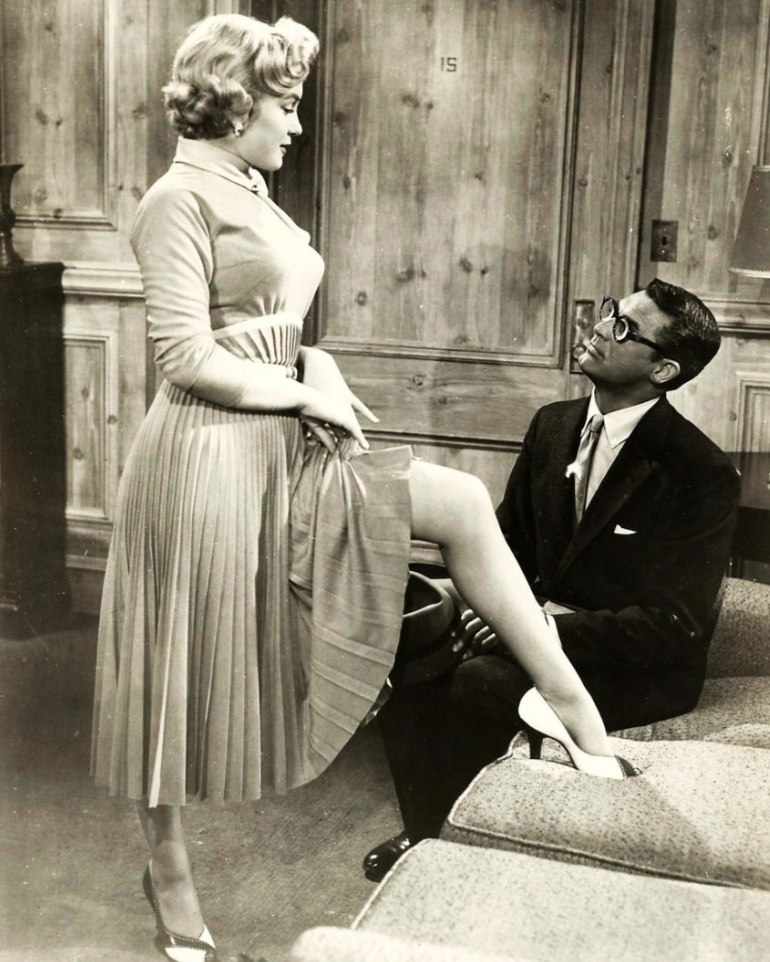While there is so much wasted on the self-conscious, yet simultaneously overly arrogant young, perhaps even more than youth itself being unjustly expended on them is the copious amount of raging hormones they can’t make any proper use of without the wisdom of “seasonedness.” Of having experienced “all the moves” (or at least attempted some of them) from the Kama Sutra.
With this in mind, the 1952 vehicle that helped further establish Marilyn Monroe as a comically innocent sex symbol, Monkey Business, is an exploration of this very notion–that were the “old” and “aged” to lose some of their inhibitions as they were able to at the peak of their hormonal teen years, then they might just get a chance to finally do things right with their lives–at least sexually.
This seems to be Dr. Barnaby Fulton’s (Cary Grant) belief when it comes to his scientific research on chimpanzees for Oxly Chemical Company. The aim of the project–billed by head of the company Oliver Oxly (Charles Coburn) as “B4” (“Why B4?” Barnaby asks, to which Oliver replies matter-of-factly, “B-4, as in, ‘before and after.’ Emphasizes the youth angle”)–is to get adults to feel young again. If it sounds too good to be true, Barnaby would tend to agree, warning Mr. Oxly to take the experiment with a grain of salt, “Mathematically, we may never find the right combination…or the exact proportions to produce the effect you’re talking about. It would be a miracle.” Almost as much of a miracle as Barnaby paying even half of the same amount of attention to his longtime wife, Edwina (Ginger Rogers, a long way from pretending to be a twelve-year-old girl Billy Wilder’s 1942 film, The Major and the Minor), as Mr. Oxly does to his secretary, Lois Laurel (Marilyn Monroe)—of her incompetence, he shrugs while ruminating on her physique, “Anyone can type.”
Even so, despite the faded physical lust between them, there is still an overt sense of attachment and fondness. One that prompts Barnaby to remind Edwina of the time when they were still newlyweds and couldn’t even make it to a party without keeping their hands off of each other–ergo not making it at all. And as he fails to comprehend that she’s just cancelled their entire evening together on account of letting him do his absent-minded scientist thing, he notes as she makes his dinner, “It’s queer about people. Through no fault of their own, they get older.” She quips, “Now, that’s a profound remark.” Trying to seek some unknown revelation, he insists, “No, they do get older. Something happens to them.” Defensively, she asks, “Are you referring to me, Barnaby?” He assures, “No, I was thinking of the human race as a whole. Pretty sad group.”
This much is proven when one of the very chimpanzees they’re using as part of the experiment, Esther, ends up mixing together the ideal “youth” formula absent-mindedly with no mental block whatsoever, tossing it into the water cooler as she gets caught outside of her cage. It is at this point that the narrative turns decidedly screwball, with anyone who drinks the elixir (unbeknownst to them for the most part) becoming absolutely buck wild–puerile to a fault. Like when Edwina, who has now literally let her hair down, insists on driving her and Barnaby to the Pickwick Inn in San Diego to go dancing (she’s Ginger Rogers first and foremost, lest you forget). Acting all manner of irascible, green-eyed and coy, she ends up locking Barnaby out of the hotel in her fit over a kiss he gave to someone back in elementary school. So yes, in this respect, hormones are not channeled quite as they should be within the youthful mind and body, for instead of concentrating them on the pleasure of boning, they choose the frivolity of jealous rages.
The staidness of the adult mind, so bristled by sex more than excited by it as it was in adolescence, is manifested most clearly when Lois shows off her “stockings” (filled by the signature Monroe leg) to Barnaby, who invented the no-snag fabric for them. He stares at it with not a lustful thought in his mind, examining it as a work of art for its practical, not biological purposes. To this end, the stamping out in particular of the male libido in modern times has somewhat mimicked this very scene as no man seems to know how to strike the perfect balance between sexually charged and outright rapist (a disparity made glaring in both the pre- and post-#MeToo era).
As the hijinks escalate throughout Monkey Business (during which time, as John Bender from The Breakfast Club would say, nobody “seems to be doing any business”), it becomes increasingly clear that Hawks and his bevy of screenwriters–Harry Segall, Ben Hecht, Charles Lederer and Billy Wilder go-to I.A.L. Diamond–are working up to some very important message about how to balance the horrors of aging with the desire to cling mercilessly to one’s youth. It all comes, in classic I.A.L. Diamond fashion (see: Some Like It Hot), in the final line, in which Barnaby finally appears to have let go of some of his stodgier scientist traits to inform Edwina, “I’ve got a new formula. You’re old only when you forget you’re young.” Would that you could tell that to the sciatica when you’re attempting the Kama Sutra.



















